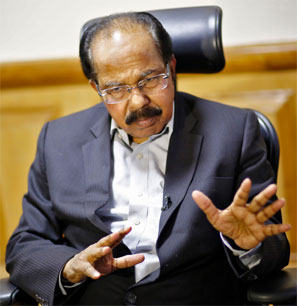 NEW DELHI: Amidst controversy over gas price hike, Oil Minister M Veerappa Moily has told Prime Minister Manmohan Singh that Reliance Industries’ contract for KG-D6 gas fields cannot be terminated pending arbitration on issue of output lagging targets.
NEW DELHI: Amidst controversy over gas price hike, Oil Minister M Veerappa Moily has told Prime Minister Manmohan Singh that Reliance Industries’ contract for KG-D6 gas fields cannot be terminated pending arbitration on issue of output lagging targets.
Moily in a 13-page letter to the Prime Minister explained the process, the contractual requirement and the steps followed for raising natural gas prices from April 1, without which several gas fields of both private sector firm RIL and state-owned ONGC would be economically unviable to produce.
Rebutting allegations by the AAP and its leader Arvind Kejriwal that the price increase was done to benefit RIL, Moily on February 14 wrote to Singh saying ONGC’s average cost of producing natural gas was about USD 3.6 per million British thermal unit in 2012-13 and its newer finds in deep-sea cost more than current rate of USD 4.2.
Public sector firms ONGC and Oil India Ltd (OIL) account for about 80 per cent of India’s gas production and will be the major beneficiary of gas rates going up from USD 4.2 to USD 8.
Kejriwal before resigning as the Chief Minister of Delhi had ordered the Anti-Corruption Bureau to register an FIR against Moily, RIL and its Chairman Mukesh Ambani for allegedly creating an artificial shortage of gas in the country and raising prices.
On gas production from RIL’s eastern offshore KG-D6 gas fields lagging targets since 2010-11, Moily told Singh about the process initiated by his predecessor S Jaipal Reddy of penalizing the firm by disallowing a portion of cost incurred.
While the contract provides for termination in case of a default by a contractor, Reddy in May 2012 had slapped penalty of USD 1.005 billion. RIL disputed the penalty and initiated arbitration.
“In view of the contractual provision under the PSC (production sharing contract), the government will not be able to terminate the contract on account of shortfall in production as the matter is pending before the arbitral tribunal,” Moily wrote. .
The production sharing contract (PSC) does not have any explicit provision for penalties in case of default. A contract can only be terminated in case of a default but Reddy used the penalty route in case of RIL.
Explaining the reasons behind raising natural gas prices from April, Moily said several gas fields of both RIL and state-owned Oil and Natural Gas Corp (ONGC) were economically unviable to produce at current rate of USD 4.2 per million British thermal unit.
Unless massive investment and technology are infused in the upstream oil and gas exploration and production (E&P), domestic production will keep on dwindling, he warned.
“In choosing the basis for fixing the gas price, it is tempting to think that by choosing a lower price we are assuring consumers the same amount of gas supply at a lower price.
“The fact is that the price formula affects the investment that will be undertaken in exploration and production and therefore the total volume of gas likely to be produced,” Moily wrote in his letter.
At current rate of USD 4.2, many projects especially in high potential basins of Krishna Godavari and Cauvery are not viable. Many discoveries have not been declared commercial at current rates.
“Sticking to gas price of USD 4.2 will result in foregoing gas production from these blocks. Further the gas prices can be incentive for higher production in deepwater areas and production from marginal fields,” he said.
For enhancing investment in E&P sector, it was important that producers in India get at least the average price of what producers elsewhere are getting. Or else producers will have the incentive to invest abroad and import LNG, he said.
Moily said keeping domestic rates artificially low would create a “perverse” incentive for E&P companies, reduce domestic gas exploration and production and encourage increased import of LNG at higher prices.
“This in turn would worsen the fiscal deficit and current account deficit and undermine the energy security of the country. The Indian economy can ill-afford such an outcome at this juncture,” he said. -PTI





